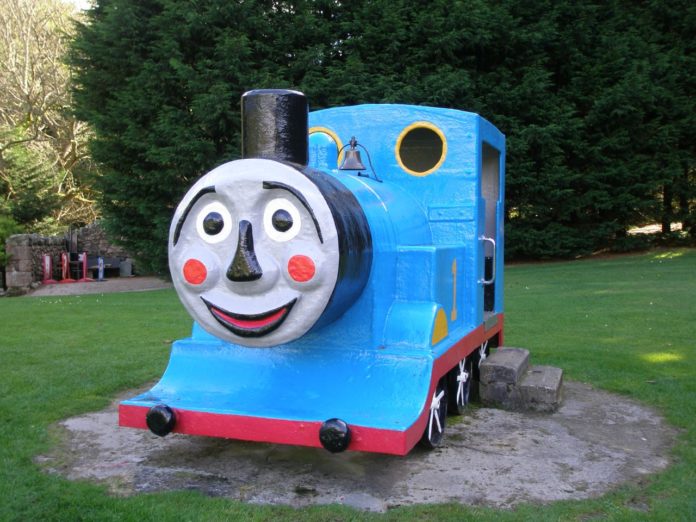Tara Brady reviews your childhood favourite and finds it to be a land of anthropomorphic chattels that toil neither for financial reward nor freedom.
It is unclear whether the knighthood conferred upon Sir Topham Hatt, the ‘Fat Controller’ of the abysmal manor of Sodor Island, is hereditary. The foot-scraping deference shown to him by the unswerving lackey that is Thomas the Tank Engine insinuates that the title is surely hereditary, handed down through generations of feudal lords.
Hatt’s mother, known only as Dowager Hatt, demonstrates that there is nothing nouveau about the privileges enjoyed by their serf-making family.
Lenin’s notion that imperialism represents the highest form of capitalism may have been undermined by the current GTA Bezosopoly in which we find ourselves, but even the callous labourer-exterminating Bezosopoly has yet to hit the big-brain peak that is Sodor.
Here, labour (the slave trains) serves capital and – in a fiendish twist – is capital. The anthropomorphic chattels toil neither for financial reward nor freedom. With chilling echoes of Nazi ‘non-productive’ eugenic policies, the trains find joy in the eternal servitude of being a “really useful engine”.
There is no possibility for improved working conditions in this nightmarish fascist corpocracy. Worker is pitched against worker. Any innovative deed, individual thought, or ambition is routinely discouraged and jeered.
In a peculiarly Foucauldian twist, when Thomas whistles impatiently at a tardy police officer, he is promptly replaced.
The trains enthusiastically champion and maintain the system that oppresses them. “Do some hard work for a change!” they scold.
They are paranoid on their boss’s behalf. The arrival of a hot air balloon sends a wave of terror through engine-kind, as the interloping dirigible could take business from the railway. Similarly, when it is rumoured that Harold the Helicopter will take over from the mail train, Thomas and Percy work hard to thwart the chopper’s prospects.
Meanwhile, Thomas and Percy, supposedly lifelong chums, constantly fight over “special” jobs so that they might impress the ruling class.
The ruling class is synonymous with their boss. The island has an ill-defined mayor and nobility (the Duke and Duchess of Boxford). But with a nod to the mixed messages pioneered by Vladislav Surkov, these political signifiers simultaneously trumpet democracy and aristocracy while embodying neither.
The alternative to the slavery enjoyed by the useful steam-powered idiots is something worse than death. This is exemplified by the terrible fate that befalls Hiro. The Japanese engine is taken from his native country where he enjoyed some status and autonomy as “Master of the Rails” only to be bound to the infernal island of Sodor.
His immigrant status appears to motivate Spencer’s scheme to have Hiro sent to the smelter’s yard. Hiro remains eager to please yet Sir Topham Hatt is furious when Hiro attempts to assist him by repeating his orders.
Before you can say “imperialism’, the corpulent tyrant is bellowing that he, and only he, is the “controller over the rails.” Hiro, stopping just short of sepukku, dutifully apologises to his boss and to all of the trains he has interacted with. He is later found forgotten, broken and abandoned in a forest, too ashamed to seek out the Fat Controller or the others now that he has outlived his usefulness.
Technological innovations that might lessen the burden faced by the engines are treated with suspicion. Invariably, all innovations, even technological ones, flounder on the rocks of Sodor. Harold the Helicopter is grounded by high winds. Diesel, the twisted shunter, is a sinister agitator who is incapable of doing anything right. Tellingly, he presents himself as “revolutionary”. Electric trains cause burns and are apt to run out of battery.
Anything that threatens the status quo on Sodor is an unwelcome and inefficient development.
Feminity is predictably an unwelcome aberration in this top-down patriarchy. Females are, at best, a subservient nuisance, like the lickspittle Annie and Clarabel, the carriages who cheer (or nag) Thomas from – their proper station in Sodor – behind. Or they are like Daisy, the diesel railcar, is strident, highly strung, generally wrong and duller than any of these attributes imply. Her name, suited for a scullery maid, and her fuel, mark her as hailing from the lower, undesirable orders.
These clattering females, as vacuous and unlikeable as they are, give no lie to James Connolly’s idea that “The worker is the slave of capitalist society, the female worker is the slave of that slave.”
GTA Bezopoly Alexa: Where is the nearest scrapyard?





